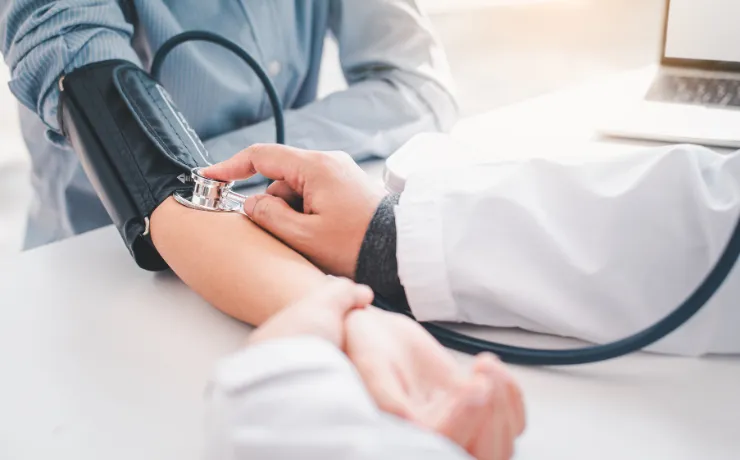Blog
Early Detection Saves Lives: Types of Screenings Offered at Pharmacies

Routine health screenings play a critical role in early detection, prevention, and long-term health. While many patients associate these screenings with clinics or hospitals, pharmacies also offer convenient access to a variety of basic health checks—right in your community.
Note: These tests are for informational purposes only and may not be available at all pharmacies. Always consult with a healthcare provider for diagnosis and treatment.
In this article, we’ll explore the types of health screenings often associated with pharmacy care, how they can support early detection, and why staying informed about your health matters.
Why Health Screenings Are Important
Health screenings are preventive checks that look for signs of health conditions before symptoms appear. Detecting issues early allows for quicker intervention, better outcomes, and in many cases, reduced healthcare costs.
Regular screenings can:
-
Identify risk factors for chronic diseases
-
Help monitor your health status over time
-
Promote informed conversations with your provider
-
Encourage healthier habits
Even simple screenings can make a big difference when it comes to preventing serious health concerns.
1. Blood Pressure Checks
High blood pressure, also known as hypertension, is often called the “silent killer” because it typically shows no symptoms until complications arise. Routine blood pressure screenings help you track this critical number and detect problems early.
What it tells you:
-
Systolic and diastolic pressure
-
Risk for heart disease, stroke, and kidney problems
When to check:
-
At least once every 1–2 years for adults with normal readings
-
More often if you have elevated readings or risk factors
Many pharmacies offer quick and painless blood pressure readings, sometimes through digital kiosks or with the assistance of a pharmacy team member.
2. Blood Sugar Monitoring
Monitoring blood glucose levels is especially important for people with diabetes or those at risk. Blood sugar screenings measure the amount of glucose in your blood at a given moment.
Why it matters:
-
Helps identify risk of diabetes or prediabetes
-
Detects signs of high or low blood sugar
-
Encourages better dietary and lifestyle choices
A simple finger-prick test can give you immediate results and help you take control of your health.
3. Cholesterol Screenings
High cholesterol often has no warning signs but can lead to serious problems like heart disease. A cholesterol screening measures fats in your blood, including:
-
Total cholesterol
-
HDL ("good") cholesterol
-
LDL ("bad") cholesterol
-
Triglycerides
What it helps with:
-
Identifying cardiovascular risk
-
Guiding lifestyle and diet changes
-
Determining if further testing is needed
These screenings may be available at community health events or through referral by your pharmacist to a primary care provider.
4. BMI and Weight Assessments
Many pharmacies offer tools to check your body mass index (BMI), a number calculated from your height and weight that gives an estimate of body fat.
Why it’s useful:
-
Assesses weight-related health risks
-
Supports weight management plans
-
Encourages healthy conversations about diet and activity
BMI screenings are non-invasive and quick—and your pharmacist can help explain the results in the context of your overall health.
5. Immunization Reviews
While not a traditional screening, vaccine reviews are a key part of preventive health. Pharmacists can assess your immunization history and let you know if you're due for any routine vaccines.
Commonly reviewed vaccines:
-
Flu
-
Pneumonia
-
Shingles
-
COVID-19
-
Tetanus boosters
Staying up to date with your vaccines helps prevent illness and protects those around you, especially in community settings.
6. Medication Therapy Management (MTM)
Medication reviews aren't lab tests, but they serve a similar purpose—screening for potential drug interactions, duplications, or ineffective treatment plans. During a medication therapy management session, your pharmacist will:
-
Review all your current medications
-
Identify issues or risks
-
Suggest ways to optimize your regimen
This service is especially helpful for patients managing chronic conditions or taking multiple prescriptions.
7. Smoking Cessation and Lifestyle Counseling
Some pharmacies provide screenings and consultations related to lifestyle habits that impact long-term health, such as smoking, diet, and exercise. While not diagnostic, these services help flag areas for improvement and offer support for making changes.
Benefits include:
-
Motivation and accountability
-
Access to quitting aids or tools
-
Goal-setting for long-term wellness
What to Expect from Pharmacy-Based Screenings
Screenings performed at a pharmacy are quick, non-invasive, and confidential. Depending on the type of screening, you may receive your results right away or get a recommendation to follow up with your doctor.
A pharmacy health screening may include:
-
Filling out a short health questionnaire
-
A quick blood pressure or glucose test
-
Step-by-step guidance from your pharmacist
-
A printout or verbal summary of your results
Pharmacists are trained to explain your results in simple language and help you understand what steps to take next.
When to Get Screened
How often you should get screened depends on your age, family history, and personal risk factors. Here's a general guideline:
| Screening Type | Suggested Frequency |
|---|---|
| Blood Pressure | Every 1–2 years (more if elevated) |
| Blood Sugar | Every 3 years (annually if at risk) |
| Cholesterol | Every 4–6 years (more if at risk) |
| BMI/Weight | Annually |
| Medication Reviews | Annually or with medication changes |
| Vaccine Reviews | Annually |
Always speak with your healthcare provider for personalized recommendations.
Talk to Your Pharmacist
Pharmacists are one of the most accessible healthcare professionals—and they can help you understand your screening results and what to do next. If your screening indicates a health concern, they may:
-
Refer you to a physician
-
Recommend lifestyle changes
-
Review your medications
-
Help you set health goals
Pharmacy-based screenings are a great first step toward better health, especially for busy patients who might not visit a doctor regularly.
Conclusion
Early detection truly saves lives. Screenings offered at pharmacies make it easier for patients to take control of their health, catch problems early, and stay informed. Whether it’s checking your blood pressure, reviewing your medications, or getting help with lifestyle changes, your local pharmacy is here to support you every step of the way.
Reminder: This article is for informational purposes only. Not all pharmacies offer these services, and they are not a substitute for professional medical care.

Request A CallBack
Have a question or need assistance? Request a call back, and one of our friendly team members will reach out to you as soon
